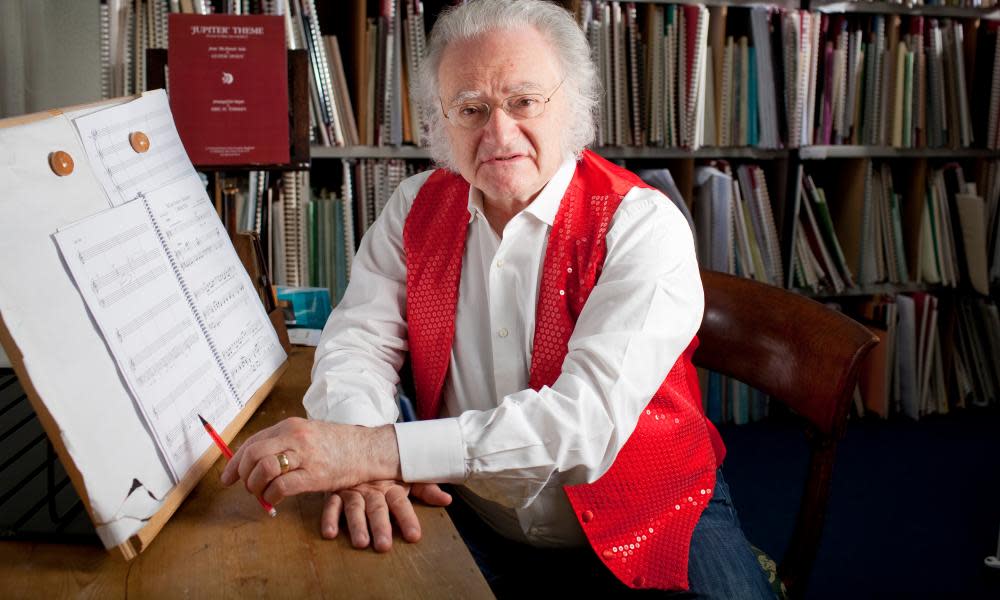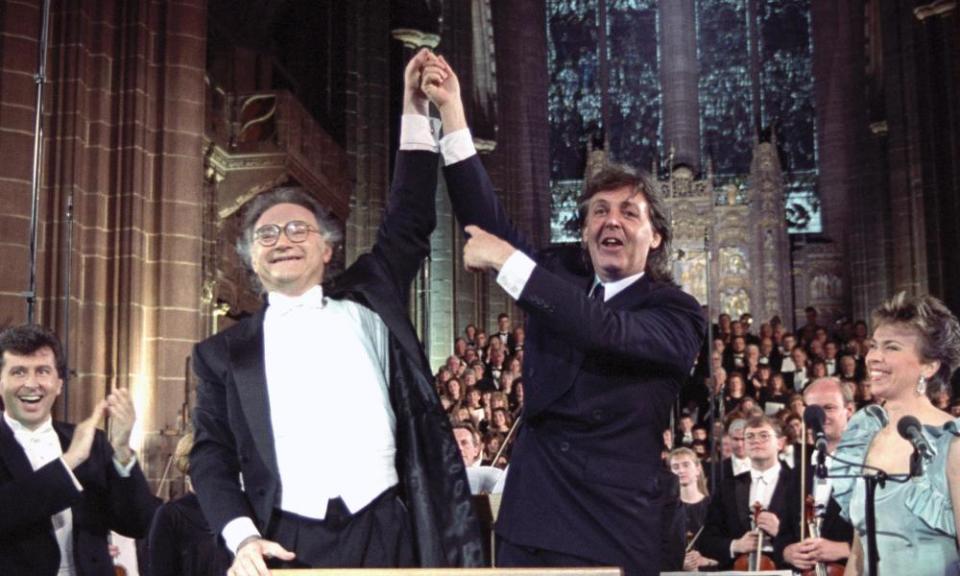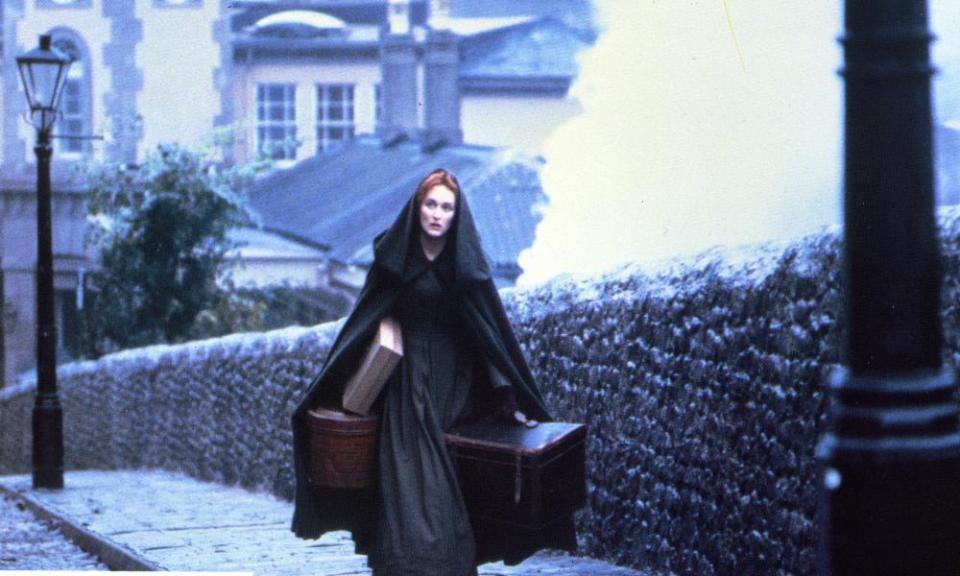Carl Davis obituary

If anybody deserved the title of “Renaissance man” it would be Carl Davis, who has died aged 86 following a brain haemorrhage. A formidably gifted composer and conductor, in a career spanning seven decades he wrote scores for a string of successful films and a long list of some of the best remembered programmes on British television, including the 1995 BBC production of Pride and Prejudice.
Davis won a Bafta and an Ivor Novello award for his score for Karel Reisz’s The French Lieutenant’s Woman (1981), scripted by Harold Pinter and starring the Oscar-nominated Meryl Streep, and worked on many other prominent films, including Scandal (1989), starring Ian McKellen and Joanne Whalley, Ken Russell’s The Rainbow (1989) and The Great Gatsby (2000). His theme music for the 1984 horse-racing drama Champions, starring John Hurt as the Grand National winner Bob Champion, was subsequently used by the BBC for its Grand National coverage.
A fascination for the era of silent movies prompted Davis to create new scores to accompany numerous classics from cinema’s early years, including his composition for Abel Gance’s sprawling 1927 epic, Napoleon. His work helped trigger an international revival of presentations of silent films with a live orchestra.
Related: Letter: Carl Davis the showman
He achieved another career highlight when he collaborated with Sir Paul McCartney on his Liverpool Oratorio, an eight-movement piece based on McCartney’s experiences of growing up in Liverpool. The piece was recorded in Liverpool Cathedral in 1991, featuring the classical soloists Kiri Te Kanawa and Willard White.
Despite his relentless schedule and prolific output, Davis enjoyed a reputation as an expansive and witty conversationalist who could always make time for friends or interviewers. When conducting at occasions such as the Royal Liverpool Philharmonic’s Summer Pops concerts or the BBC’s Proms in the Park, he would gently subvert notions of classical seriousness by conducting in a union jack outfit or a gold lamé coat.
Born in Brooklyn, New York, Carl was the son of Sara (nee Perlmutter), a teacher, and Isadore Davis, a post office worker. His Jewish family had ancestry in Poland and Russia. Encouraged by his mother, he displayed precocious musical ability. He started playing piano at the age of two, and soon became an adept sight-reader. He recalled how from an early age he would listen to the Metropolitan Opera’s live radio broadcasts on Saturday afternoons, and he would obsessively study musical scores of operas and orchestral pieces obtained from Brooklyn’s public libraries.
He took lessons with the composers Hugo Kauder and Paul Nordoff (later the co-founder of the Nordoff-Robbins music therapy programme), then with the Danish modernist composer Per Nørgård in Copenhagen. He studied at Queens College, New York, and the New England Conservatory of Music, Boston, and as an 18-year-old served as an accompanist to the Robert Shaw Chorale. He then attended Bard College in Annandale-on-Hudson in upstate New York, which has had a remarkable roll-call of actors, writers, film-makers and musicians pass through its portals. He graduated from Bard as a composer, having already begun to compose music for theatrical productions.

In 1958 he became an assistant conductor at the New York City Opera, and then won an off-Broadway Emmy award as co-composer of the 1959 revue Diversions. This was staged at the Edinburgh festival in 1961 and subsequently transferred to the Arts theatre in London, retitled Twists. It caught the eye of Ned Sherrin, then working in production at the BBC. He commissioned Davis, who had moved to London and was living in decrepit lodgings in Notting Hill, to write music for the satirical TV show That Was the Week That Was.
It was the start of his prolific and varied career in the UK. The Davis touch added lustre to the television movies The Snow Goose (BBC, 1971) and The Naked Civil Servant (Thames Television, 1975); the adaptation of the Anita Brookner novel Hotel Du Lac (BBC, 1986); and the miniseries A Year in Provence (BBC, 1993) and A Dance to the Music of Time (Channel 4, 1997) among many others.
A notable milestone was his ominous and unsettling score for Thames’s The World at War (1973), which was produced by Jeremy Isaacs. It was through Isaacs that Davis became involved in the Thames TV series Hollywood: A Celebration of the American Silent Film, based on the book The Parade’s Gone By … by the film historian Kevin Brownlow.
Davis was tasked with tracking down musicians who had worked on films during the silent era, and the series set him off on a decades-long crusade to revive silent films with newly created scores. He enjoyed the challenge of conducting the music live as the film played. “You have to keep going,” he told the Arts Desk’s Graham Rickson in 2021. “Some conductors use click tracks and headphones. I’m old-fashioned and don’t like being tied to machinery – I try to conduct these things with as little apparatus as possible.”
The most dramatic expression of this was his work on Napoleon, and in 1980 Davis conducted a performance of it with an orchestra and audience at the Empire, Leicester Square. “That first screening wasn’t flawless, but it was electrifying,” he recalled. He subsequently conducted performances around the world, and the score let to him being appointed chevalier of France’s Ordre des Arts et des Lettres in 1983.
He went on to compose music for more than 50 silent films featuring stars such as Greta Garbo and Rudolph Valentino, for comedies by Charlie Chaplin, Harold Lloyd and Buster Keaton, and for classics such as Ben-Hur (1925), the Douglas Fairbanks swashbuckler The Thief of Bagdad (1924) and DW Griffith’s Intolerance (1916).

Another genre which Davis excelled at composing for was dance. “The relationship between film and ballet is striking, and I find myself composing more and more ballet scores now, something which the film work has made me much better at,” he told Rickson. For Northern Ballet theatre, he worked with the choreographer Gillian Lynne on A Simple Man (1987) and Lipizzaner (1989). For Scottish Ballet, he collaborated with Robert Cohan, a fellow New Yorker, on A Christmas Carol (1992) and Aladdin (2000). And for English National Ballet’s Alice in Wonderland (1995), Davis (commissioned by ENB’s artistic director Derek Deane) drew on themes by Tchaikovsky.
It was also through Deane’s influence that Davis was commissioned by the National Ballet of Croatia to write Lady of the Camellias (2008), which gave him the opportunity to revisit Alexandre Dumas’s original novel and Verdi’s operatic version of it, La Traviata. The opera had been a favourite of Davis’s since his childhood days of listening to Met broadcasts, and he had also worked on a production of it for New York City Opera. The resulting piece gave the story a contemporary twist, so “the action could flow without pause and indeed the production did effectively utilise projections and film”, as Davis wrote in the recording’s sleeve notes.
He received a Bafta special lifetime achievement award in 2003, and in 2005 he was made CBE.
In 1970 he married the actor Jean Boht, who starred in Carla Lane’s sitcom Bread. She survives him, along with their daughters, Hannah and Jessie.
• Carl Davis, composer and conductor, born 28 October 1936; died 3 August 2023

 Yahoo News
Yahoo News 
